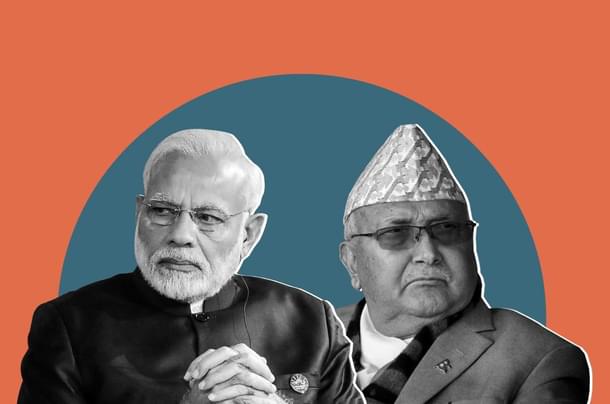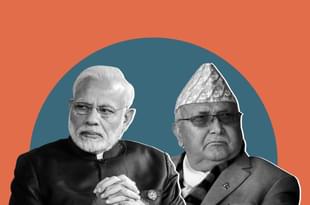World
India’s Suspension Of Palm Oil Imports From Nepal Could Hit Kathmandu’s Trade Balance Next Fiscal, Suggest Data
M R Subramani
Jul 03, 2020, 02:20 PM | Updated 02:19 PM IST
Save & read from anywhere!
Bookmark stories for easy access on any device or the Swarajya app.


Palm oil and soybean oil have come to Nepal’s rescue in merchandise trade, accounting for 32.3 per cent of the value of the Himalayan nation's export earnings during the first 11 months of its current fiscal year.
India has suspended giving permission to import of palm oil from Nepal since May and it continues until now. If the suspension continues, a likelihood in view of the aggressive posture by Nepal against India on border and other issues, Nepal's trade balance could be badly affected.
According to Nepal’s Trade and Export Centre, palm oil exports made up Nepal rupees (NR) Rs 1,831 crore (approximately Indian Rs 1,139 crore) or 20.8 per cent out of total export earnings of NR 8,800 crore.
Soybean oil contributed NR 1,012 crore (Indian Rs 629 crore) or 11.5 per cent of total export earnings. Nepal’s financial year runs from the Hindu calendar of Shravan to Asar (mid-July).
Polyester, cotton and other yarn exports were the third-best making up 7.6 per cent of the total export earnings. A feature of palm oil and soybean oil exports was that their value doubled and nearly quadrupled respectively in the first 11 months.
While palm oil exports value increased 110.5 per cent compared with the previous fiscal, that of soybean oil surged 393.5 per cent during the same period.
However, compared to exports, their imports — termed as crude palm and soybean oils — made up 3.1 per cent of the total value. Palm oil imports by Nepal were valued at NR 1,616 crore and soybean shipments at NR 1,213 crore.
Nepal total imports were valued at NR 11,008 crore with petroleum product shipments making up nearly 18 per cent. While the value of Nepal exports, thanks to the edible oil shipments, increased by a meagre 0.2 per cent, imports value were down 15 per cent during the period.
According to officials in the Solvent Extractors Association of India, this is a clear indication of Nepal misusing the South Asia Free Trade Area (SAFTA) agreement, particularly by violating the “rules of origin”.
The “rules of origin” requires a product exported from a specified country to originate or be produced from there itself. In the case of palm and soybean oils, Nepal neither produces them nor has refineries to process crude oils it imports.
However, the Nepal government contends that while shipping out palm and soybean oils, its traders are meeting the 30 per cent value addition norms for exporting these commodities.
Nepal’s Trade and Export Centre has specifically stated that it has imported crude palm and soybean oils, but it has not mentioned in what form were both these vegetable oils re-exported defining merely as palm oil and soybean oil.
A sharp rise in the value of these edible oil exports is the reason why Nepal’s trade deficit has dropped this fiscal. The export-import ratio of Nepal’s trade this fiscal is 1:12.5 against 1:1.48 last fiscal.
If India continues to prevent import of palm oil from Nepal, then the export-import ration could be skewed further in favour of imports.
On the other hand, there could be a drop in its import bill too as palm oil and soybean oil purchases by Nepal will drop sharply.
The data is significant on the heels of a hue and cry raised by Nepal over India cancelling permission to import palm oil from the Himalayan nation.
Under SAFTA pact, imports from Nepal are allowed duty-free. Some of Indian importers get these vegetable oils into Nepal at lower duty and then misuse the agreement to land them into India without paying any customs duty.
This happens mainly in Bihar and West Bengal bordering Nepal.
In May this year, Indian cancelled permission to import 2.93 lakh tonnes of refined palm oil from Nepal for misuse of SAFTA agreement. Almost all these consignments were being imported by traders in Bihar and Bengal.
The cancellation of permission was part of the Narendra Modi government’s efforts to block imports of cheaper palm oil into the country that affected Indian oilseed growers.
On 11 May, Nepal urged India to allow its traders to export palm oil and tea to the Indian market. The status quo remains as India continues to deny access to these products in its market.
In January this year, the Centre put imports of refined palm oil in restricted list, which means getting permission from the Directorate-General of Foreign Trade (DGFT). Besides duty on imports of crude palm oil and refined vegetable oils were raised to protect Indian oilseed growers.
Besides palm oil, India has also stopped imports of tea from Nepal as it has dragged down the prices of Darjeeling tea. Since May, exports of palm oil and tea from Nepal have come to a halt, according to the Himalayan nation's media.
India’s relations with Nepal have been strained of late with the latter objecting to New Delhi’s inauguration of a road on the Lipu Lekh Pass. Kathmandu has also complicated the relations by coming out with a new political map including Indian areas as its parts.
M.R. Subramani is Executive Editor, Swarajya. He tweets @mrsubramani





